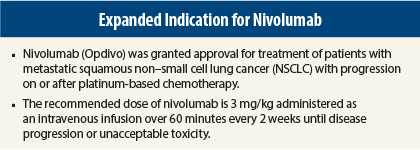In the Clinic provides overviews of novel oncology agents, addressing indications, mechanisms, administration recommendations, safety profiles, and other essential information needed for the appropriate clinical use of these drugs.
On March 4, 2015, the anti–programmed cell death protein 1 (PD-1) monoclonal antibody nivolumab (Opdivo) was granted approval for treatment of patients with metastatic squamous non–small cell lung cancer (NSCLC) with progression on or after platinum-based chemotherapy.1,2 Nivolumab was previously approved in December 2014 for treatment of previously treated unresectable or metastatic melanoma.
Supporting Studies
Approval was based on improved overall survival with nivolumab treatment in a phase III open-label trial in which 272 patients with metastatic squamous NSCLC with disease progression during or after one prior platinum doublet–based chemotherapy regimen were randomly assigned to receive nivolumab at 3 mg/kg every 2 weeks (n = 135) or docetaxel at 75 mg/m2 every 2 weeks (n = 137).2 Patients were included regardless of PD-L1 [PD-1 ligand] status; those with symptomatic interstitial lung disease or untreated brain metastasis were excluded.
Patients had a median age of 63 years (range = 39–85 years, 44% ≥ 65 years, 11% ≥ 75 years). Most were white (93%) and male (76%). Baseline Eastern Cooperative Oncology Group performance status was 0 (24%) or 1 (76%).
On interim analysis, median overall survival was 9.2 months (95% confidence interval [CI] = 7.3–13.3 months) in the nivolumab group vs 6 months (95% CI = 5.1–7.3 months) in the docetaxel group (hazard ratio = 0.59%, P = .00025).
Response and safety data are from a single-arm study of nivolumab at 3 mg/ kg in 117 patients who had disease progression after platinum-based therapy and at least one additional systemic regimen.3 Patients had a median age of 65 years (range = 37–87, 50% ≥ 65 years, 14% ≥ 75 years), most were male (73%) and white (85%), all had received at least two prior systemic treatments (2 in 35%), 94% had stage IV disease, 2% had brain metastasis, and performance status was 0 (22%) or 1 (78%).
The overall response rate in the single-arm study was 15% (95% CI = 9%–22%), with 10 (59%) of 17 responding patients having response durations ≥ 6 months at the time of analysis.
How It Works
Nivolumab is a human immunoglobulin G4 (IgG4) monoclonal antibody that binds the PD-1 receptor on T cells and prevents its interaction with the ligands PD-L1 and PD-L2, thereby blocking PD-1 pathway–mediated inhibition of immune response, including antitumor immune response.
Binding of PD-L1 and PD-L2 to the PD-1 receptor inhibits T-cell proliferation and cytokine production. Upregulation of PD-1 ligands occurs in some tumors, and signaling through this pathway can contribute to inhibition of active T-cell tumor immune surveillance. In syngeneic mouse tumor models, blocking PD-1 activity results in decreased tumor growth.
How It Is Given
The recommended dose of nivolumab is 3 mg/kg administered as an intravenous infusion over 60 minutes every 2 weeks until disease progression or unacceptable toxicity.
Nivolumab treatment should be withheld for grade 2 pneumonitis, grade 2 or 3 colitis, alanine transaminase or aspartate transaminase > 3 to 5 times upper limit of normal or total bilirubin > 1.5 to 3 times upper limit of normal, serum creatinine > 1.5 to 6 times upper limit of normal or > 1.5 times baseline level, and any other severe or grade 3 treatment-related adverse reactions. Nivolumab can be resumed when adverse reactions resolve to grade 0 or 1.
There are no recommended dose modifications for hypothyroidism or hyperthyroidism. No dose modifications are required in patients with renal impairment or mild hepatic impairment; the drug has not been studied in patients with moderate or severe hepatic impairment.
Nivolumab should be discontinued for any life-threatening or grade 4 adverse reaction, grade 3 or 4 pneumonitis, grade 4 colitis, alanine transaminase or aspartate transaminase > 5 times upper limit of normal, total bilirubin > 3 times upper limit of normal, serum creatinine > 6 times upper limit of normal, any recurring severe or grade 3 treatment-related adverse reaction, inability to reduce corticosteroid dose to ≤ 10 mg/d of prednisone or equivalent within 12 weeks, and persistent grade 2 or 3 treatment-related adverse reactions that do not recover to grade 0 or 1 within 12 weeks after the last dose.
Safety Profile
In the single-arm trial in 117 patients, the most common adverse events of any grade were fatigue (50%), dyspnea (38%), musculoskeletal pain (36%), decreased appetite (35%), and cough (32%). The most frequent grade 3 or 4 adverse events were dyspnea (9%), fatigue (7%), musculoskeletal pain (6%), and pneumonia (5%). Clinically significant immune-mediated adverse events included pneumonitis, colitis, hepatitis, nephritis/renal dysfunction, hypothyroidism, and hyperthyroidism.
Serious adverse events occurred in 59% of patients, with the most common being dyspnea, pneumonia, chronic obstructive pulmonary disease exacerbation, pneumonitis, hypercalcemia, pleural effusion, hemoptysis, and pain. Adverse events led to treatment interruption in 29% and discontinuation in 27%.
Nivolumab carries warnings/precautions for immune-mediated adverse reactions, including pneumonitis, colitis, hepatitis, nephritis and renal dysfunction, hypothyroidism and hyperthyroidism, and embryo-fetal toxicity. Patients should receive corticosteroid treatment for immune-mediated adverse reactions based on reaction severity.
Patients should be monitored for liver and kidney function and thyroid function. Thyroid hormone replacement should be used as needed. Breastfeeding women should discontinue breastfeeding. ■
References
1. U.S. Food and Drug Administration: Nivolumab. Available at www.fda.gov/Drugs/InformationOnDrugs/ApprovedDrugs/ucm436566.htm. Accessed March 20, 2015.
2. Opdivo® (nivolumab) injection prescribing information, Bristol-Myers Squibb Company, March 2015. Available at www.accessdata.fda.gov/drugsatfda_docs/label/2015/125527s000lbl.pdf. Accessed March 20, 2015.
3. Rizvi NA, Mazières J, Planchard D, et al: Activity and safety of nivolumab, an anti-PD-1 immune checkpoint inhibitor, for patients with advanced, refractory squamous non-small-cell lung cancer (CheckMate 063): A phase 2, single-arm trial. Lancet Oncol 16:257-265, 2015.
Report Adverse Events
Health-care professionals should report all serious adverse events suspected to be associated with the use of any medicine or device to FDA’s MedWatch Reporting System by completing a form online at www.fda.gov/medwatch/report.htm, by faxing (800-FDA-0178), by mailing the postage-paid address form provided online, or by telephone (800-FDA-1088).


